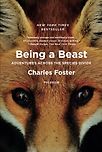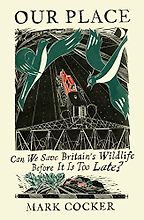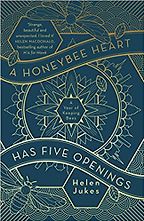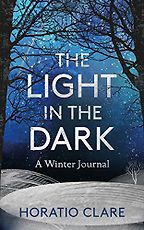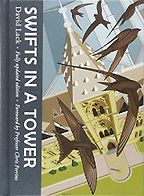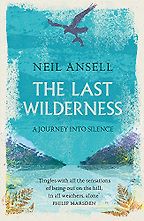Last time we spoke, you said the shelves were “groaning” with nature books. Is the genre still thriving?
Well, there are many new titles. That doesn’t necessarily mean that the genre is thriving. Commercial success is rarely a good index of worth. But in fact I think that nature writing is in an increasingly good place—or at least is doing what it should be doing. There’s an increasing acknowledgment that the natural world isn’t all romance and beauty—that the beauty is generated by the sinister Darwinian engine, fuelled by pain, waste, and competition. We see people acknowledging that trees and mountains won’t generate a completely predictable epiphany. That’s very welcome.
There have been lots of breathless accounts of how people’s lives have been transformed by walking into a wood. It’s not really like that, and some of the books we’re about to discuss redress the imbalance created by the breathless transcendentalism that has, I think, characterised the last five to ten years of British nature writing.
I know from your own work that you are in interested in the boundary—rather, the lack of a boundary—between humans and nature. Is that something that writers as a whole are taking into account?
That’s my impression. My impression is that that lesson is being realised as central, not only to readably literary nature writing, but also to the conservation we so desperately need. Many of the ills in our political relationship with nature could be cured if we saw ourselves as part of nature rather than standing astride it, as distant from it, in some sort of master-servant relationship to it.
“Our human pride is affronted by the thought that hedgehogs are our near relatives, so we deny it”
We are slowly abandoning the obscene language of the natural world as a ‘resource,’ as a ‘tool,’ as something simply to be used or consumed. We’re beginning to see it as something so closely akin to us that we can’t consume it without consuming ourselves—which is the truth. This is a truth, of course, that has only very recently been forgotten—even in the Western world. But the amnesia has been nearly complete, and has been catastrophic. Or perhaps it is not so much amnesia as denial. Our human pride is affronted by the thought that hedgehogs are our near relatives, so we deny it.
Perhaps that brings us to the first book that you wanted to discuss, Mark Cocker’s Our Place. The Guardian called it a “damning indictment of [our] ecological complacency.” No gentle nature ramble, then.
Certainly no gentle nature ramble, and a very disconcerting book. I found it uncomfortable to read. I’ve just sounded off to you about how I was glad that nature writers were beginning to rub people’s noses in the reality of nature. Well, when I started reading Mark Cocker’s book, I wasn’t so glad to have my own nose rubbed in the political realities.
Get the weekly Five Books newsletter
He starts off by telling us that the natural world we like to rhapsodise about is vanishing. The figures are terrifying: 99% of our flower-rich meadows have been destroyed in the last 70 years or so. 44 million breeding birds have just vanished from our landscape. Britain is going silent: it’s going grey instead of green, and lots of us who love the natural world find that so unbearable that we don’t (and psychologically can’t) acknowledge it. So we retreat into books which tell us that it’s all alright; that the natural world of our imagination is still there. Of course it is, to some extent, but it’s retreating fast. So this book is an uncomfortable and urgently necessary wake-up call.
What does Cocker set out to do in Our Place?
First of all, he sets out to tell us how bad it is by citing a large number of extremely depressing statistics. He then points out that there is very little reason to suppose that things are going to get any better. We are told that we need one million new homes in this country, but the plans are to build lots of the proposed new homes on irreplaceable natural sites. There’s a proposal, for example, to build 5,000 new homes on the outskirts of Rochester, which hosts Britain’s largest single population of nightingales. Having told us how bad it is, and how much worse it’s going to get, Cocker then goes on to identify some of the factors in our national politics and our personal psyches which explain the crisis.
The most telling reason he gives is that the dominant pattern in our thought processes is not the ecological circle but the straight line. We assume, for example, that we can put pesticides and herbicides on a field, that they will work, and then they will go away. Of course that’s not true. They will keep on circulating, perhaps for hundreds or thousands of years. The destruction of the natural world can all be explained in terms of our psychotic obsession with linear progress, coupled with the ludicrous notion (which all sane people, given a moment’s reflection, know to be a lie) that the important things in life can be quantified; can be bought and sold; can appear in an auditor’s spreadsheet. The delusional love of the linear is the principal axiom of Western governments. They will never be cured. Real, free, awake people are going to have to do all the work.
“We’re desperate for dominion, but dominion of a really toxic kind—a kind that will eventually kill us”
There are no straight lines in nature. But the artificial outdoors is often linear. Lincolnshire is an aseptic desert, defined by straight furrows cut by a GPS-driven tractor. We are pathologically comfortable with straight lines, with tidiness, with cleanliness, with predictability. Cocker talks about the inability of urban people to cope with anything that is tangled and unpredictable—with anything, in fact, that is interesting. Since men in suits fear and kill everything that they don’t understand, there’s a war against entanglement, complexity, relationality, and greenness.
We have a really dangerous desire for something we can control: plastic grass is the demonic icon of the age. We’re desperate for dominion, but dominion of a really toxic kind—a kind that will eventually kill us. There is a good sort of dominion: a humble type of stewardship.
Cocker writes that the traditional form of nature writing risks becoming like “the light from a dead star, traveling onwards into the darkness that will eventually consume them.” Should nature writers be activists, too?
It’s ethically inevitable. I also think it’s literarily inevitable. If you’re sufficiently connected to the natural world to have the authority to write about it, the natural world should matter desperately to you. If the natural world is being eaten, you must do something about it.
Even if you don’t feel this, you should feel a moral duty to the thing which is giving you an income. Mere gratitude for your income, and mere self-interest, should generate this duty. Nature writing is a sort of farming, isn’t it? We farm images from the natural world. We farm pictures from the wilderness. If farmers look after their land, nature writers should do so too.
Absolutely. Your second book, Helen Jukes’ beekeeping memoir, A Honeybee Heart Has Five Openings, seems to follow in the footsteps of books like H is For Hawk and The Fish Ladder in finding solace from life in the natural world. Does it succeed on its own terms?
I think it succeeds splendidly and very surprisingly. I was very suspicious of the book when I first picked it up. I thought, oh, here is a sort of ‘Bridget Jones’ Bee Diary’. Another account of someone who is being ‘redeemed’ by the natural world, and I was prepared to be extremely cynical about it. But my cynicism soon evaporated. It’s a very poised exercise in diffidence and understatement. Jukes doesn’t know what to expect when her bees come. She’s not lusting after epiphany. She doesn’t have any expectations of the bees, or indeed of the world generally.
If you come to anything with no sense of entitlement, one of the paradoxically wonderful things about the world is that you get so much more than somebody who assumes that the world owes them something.
Jukes’ strenuous effort at relationality—her effort to get to know these creatures which are so very different from her—results in her being humanised and personalised. She becomes more of who she is, and therefore she’s able to give more of herself to humans. There’s a vital lesson there.
The bees give Jukes her man. There are three stages in their gift. First they make her herself. Then they make her a person capable of loving. And finally, by a beautifully mysterious route, they deliver onto her doorstep her white-haired lover.
She doesn’t just find herself (and thus other humans). She also finds a place—the place where she happens to live. The bees root her in the very unpromising part of the wilderness which is suburban Oxford. They give her herself, and they give her a place, and they anchor her to a place in a way which was previously inconceivable. It’s a great testament to the power of humility to move mountains.
We interviewed Jukes earlier this year, and I thought she was interestingly ambivalent on the subject of bees. She said: “I’m not sure I can honestly say that I love bees. I find them so unsettling. I am so endlessly fascinated, disturbed, and confused by them.” As the author of Being A Beast, you’re perfectly placed to answer my next question. What can we learn from other species and the different ways they experience and interact with the world?
I think our efforts to relate to non-human species are all extravagant exercises in empathy, and to empathise with something very different from oneself requires a great deal more empathy than empathising with someone or something who is very closely akin to you. Empathy, like everything else, is something which gets better the more you work at it. So an attempt to relate to non-human creatures is a sort of strenuous empathy gym.
Helen, being the humble person that she is, realised quite rightly that she couldn’t get at all close to bees, and she concluded, quite wrongly, that that was a reason to give up. She should have realised, I think, that the process of continuing to fail was itself really useful and fecund and exciting. Had she been prepared to battle on, knowing very little, much more would have been revealed to her. That, after all, is the main message of the book.
Often we seek consolation from the natural world, through gardening, walking, animal husbandry. But we can’t rely on it to provide us with the harmonious experience we seek.
I agree. There never was a time when nature was entirely our friend. Or if it is friend, it’s a strange friend. The natural world will eat us all one day, whether by worms, fire, or fish. That’s one reason to be suspicious of people who get too cosy with it. It makes me wonder whether the epiphanic nature writers really know nature at all or have reflected on it properly.
Perhaps let’s move on to book three, Horatio Clare’s A Light in the Dark: A Winter Memoir, which seems very timely. He suffers from acute Seasonal Affective Disorder, or ‘SAD’. What did you find in this book?
The first thing to say is that I’m fearful for this book. I’m concerned that it’s going to be characterised as a book that’s just about SAD, and it is so much more than that. It’s a book in which he uses depression as a sort of dark light to highlight some desolate questions: Who is he? What is his relationship to the natural world? What is his relationship to his family? His low mood has made him wonder what he is. Is he an agent at all? Is he ruled by his past? Is he ruled by some malevolent archetypes welling up from his subconscious?
He’s one of our great nature writers, I think. He says that the wilderness always speaks balm. But he’s realistic. Near the beginning of the book, he talks about how maintaining his faith with the natural world will carry him through the winter. Then, right at the end of that paragraph, he says, rather tremulously, “or such is the hope.” In fact the hope is frustrated.
Yes, there are moments in which he looks at his valley and thinks: ‘This is wonderful. Why have I alienated myself from it? Yes, this can keep me safe, or heal me.’ But it’s not long before the wolf creeps close to his hearth again, and he realises that these moments of balm are not real healing. They’re just tiny sparks in the dark. The only real healing comes from that part of the natural world which is his family.
“All hermits, however great the view from their cave, and however attentive their non-human companions, are wretched”
The big lesson here is that your human community (being composed of wild things) is part of the wilderness. It is of course true that we need to relate to the non-human world—for our health and for the health of the wild world. But the non-human world by itself can’t make humans thrive. All hermits, however great the view from their cave, and however attentive their non-human companions, are wretched. All our romantic beliefs about redeeming sunsets, interconnectedness, and our kinship with birds falter when they face a big test like the one described in Clare’s book. But our human relationships stand the test—or at least, if they don’t, nothing else will. Those human relationships are actually just a special example of the relationships which we should have towards the wider world—but so special that they have a curative and prophylactic effect against the evils of the human condition that nothing else (even the song of whales, or the summit of a holy mountain, or the nuzzling of your dog) can have.
It’s interesting that a theme emerging from our discussion of nature writing is a movement towards the human collective.
Yes. It is psychologically fatuous, sociologically deadly, and ethically dangerous to see humans as atomistic entities—islands. I had nothing to do with my own conception, and have had very little to do with most of the things that have happened to me since. We are all utterly dependent creatures. That dependence should be a source of intense joy—not of frustrated disenfranchisement. Yet the atomistic model of the human person is the ruling presumption of the west.
Let’s move to Swifts in a Tower. Perhaps this makes Oxford another theme, because Swifts in a Tower is a 1956 title based on ornithological studies that took place in the Natural History Museum in Oxford. It was reprinted this year. Why should we revisit this book?
There are many reasons. David Lack’s book is a love story, really, and it’s an indication of what you can do by simple observation and dedication. When Lack did his fantastic study of the swifts he had no gadgets. There’s a chapter written by his son which describes what has been learned about swifts since 1956: it’s gratifyingly short. Yes, there has been lots of work with things like geolocators. We now know in a fair amount of detail the routes the swifts take and the speeds they travel during their migration to and from Africa. No doubt David Lack would have been fascinated by those things. I certainly am. But most of what we know now we knew in 1956, as a result of Lack climbing repeatedly up and down the steps of the tower in the University Museum, peering into the nest boxes, gazing into the sky, scouring ancient texts, reading poems, and corresponding with amateur and professional naturalists across the world.
The book shows that proper scientists (by which I mean people who are interested in the truth about nature), acknowledge no boundary between that which is traditionally and arbitrarily designated as science, and everything else. David Lack wanted to understand swifts. A typical modern scientist’s way of doing that would be to collect data, reduce them to figures, and then squeeze the figures into a box made out of materialist, reductionist presumptions. But the real world is always far too big, complex, and exciting to fit. The box never, ever holds the whole truth.
“If a scientist doesn’t write like that, he lacks the curiosity, the ambition and the humility to be a scientist”
Modern scientists forget that science is just a method, not a religion. They’re fundamentalists—just as irrational, faithful, and zealous as the Creationists they rightly despise. Lack had the humility to know that a lumpen, Earth-bound creature like him could only hope to understand anything about these astonishing birds if he suspended all his cherished presumptions and recruited everybody and everything in the effort.
The book reads like an eighteenth- or nineteenth-century naturalist’s potpourri. The poetry rubs shoulders with the figures which detail the clutch size, or whatever. He airs speculation, he retells anecdotes. If a scientist doesn’t write like that, he lacks the curiosity, the ambition and (yes, here’s that word again), the humility, which are the main qualifications for being a scientist.
That sounds like real hero worship, doesn’t it? There are less benevolent heroes than David Lack.
I think what’s lovely about this title is the feeling of it being the result of a true lifelong passion. You feel an entire career, an entire life, has been sunk into this book. Do you agree?
Yes. There’s a lifetime of wonder distilled here. The wonder began when Lack was a boy, and it never left him. Indeed, it crescendoed rather than diminished as he found out more about these birds. It’s often the other way round with boring, nerdish scientists. He wondered; he reflected. He didn’t just collect his facts and stick them in the boxes we call ‘articles’ in academic journals. They were obviously turning around in his mind all the time as he ate and slept. He lived and breathed these birds all his life, and the book shows what can happen if rigour and passion ride together.
It is certainly a scientific book, but it’s a scientific book in the true sense: a book that seeks to understand—not merely to describe using the conventional scientific adjectives.
High praise indeed. Let’s talk about your final book, The Last Wilderness: A Journey Into Silence. In it, the author writes about the wild north west coast of Scotland, a favourite haunt of my own. Why did you enjoy this book?
I picked it up and read it because I am passionate about the West coast of Scotland. It is a strange read. Its architecture is simple and rather artless. Not artfully artless, in the way that some books are. In many ways the architecture seems rather old-fashioned: Ansell just goes to places and describes them, as travel writers did a generation or two ago. There are occasional episodes in which he reminisces about previous travels and previous relationships when something in Scotland makes him think of those things. Those episodes often don’t seem to relate very obviously to the Scotland that he’s viewing. The language used for the narration is very simple, sometimes to the point of near banality.
Five Books interviews are expensive to produce. If you're enjoying this interview, please support us by donating a small amount.
And yet the book works. I’m not quite sure how. I don’t know if it works because of or despite those characteristics. Certainly its naiveté is disarming, and it made me suspend my normal critical instincts. When I did that, something rather wonderful came in. It’s a mournful, wistful, elegiac book, but that elegiac quality isn’t generated by any obvious device. Again, I can’t say how he does it.
That subtitle, ‘A Journey Into Silence,’ alludes to the loss of his hearing, and I suppose to the solitary nature of his walks, as well. What does solitude bring to our appreciation of nature?
It’s tremendously hard to give a general answer to that question. But thinking about it in the context of Ansell’s book, since he doesn’t discuss anything with an actual or metaphorical companion as he walks through Scotland, there’s no dilution of the power of the language with which the land is described. His eyes tell us, very simply, what they see. That generates a sort of intensity which is very unusual. It means that we see ferns and birds and deer and mountain summits more accurately than we normally do, because they’re uncontaminated by opinions.
Most nature books are narcissistic and discursive. The writer goes into a wood and describes his (yes, male writers are far away the worst) feelings about the wood. Those feelings almost never have anything to do with the wood itself. So: what does solitude do? It can still the distracting voices. It can turn the senses of the writer and the reader away from the usual mental toys with which we fiddle, and on to rocks and waves and leaves.
It can also produce such terrible psychological pain that you can’t see the trees through the red fog, or hear the birdsong through the hiss of panic. That’s what it tends to do to me. But Ansell is a better integrated human than I am.
I spoke to the Thoreau biographer, Laura Dassow Walls, a few months ago, and she outlined to me the ‘Thoreauvian’ narrative, which is going out into the wilderness alone, and then returning changed. Does The Last Wilderness take a similar form?
I don’t think that’s what’s happening here at all. Ansell doesn’t seem interested in himself in the slightest. That’s what gives the book its power. Ansell allows himself to be a lens through which the world is seen, rather than wanting himself to be the object upon which our eyes rest.
That denotes and expounds a haunting love of the landscape. This is not a book about Neil Ansell. I can’t think of any other book in which the writer is so invisible. Invisibility is the mark of a very good writer.
When Ansell does introduce himself, he does so reticently and almost formally, so that nothing of what we know about him bleeds out to contaminate the landscape. The West Highlands aren’t filtered through his personal hinterland. But we do learn about his failing hearing and his failing heart. That makes the book unforgettably poignant, and his voice, when he’s describing the land, unforgettably plangent.
Often the simplest songs are the most moving aren’t they?
Yes.
We feel Ansell’s own loss and potential loss. He is undemonstrative and wholly un-self-pitying, but we sense the parallel between his personal losses and the wider loss of the natural world. The natural world is being progressively lost to him. He can’t hear birds anymore. Because his heart’s weak, he’s teetering, he knows, on the edge of eternity. He knows that soon he’ll lose the whole world. Being mortal, we feel solidarity with him. We begin to know how desolate it would be to lose the natural world – whether by our personal death or blindness or deafness, or by a multi-storey car park being built on it.
So we’ve come full circle. Acute nature writing necessarily makes political points, and it makes them more impressively if it doesn’t ram them down our throats.
Interview by Cal Flyn, Deputy Editor
November 23, 2018
Five Books aims to keep its book recommendations and interviews up to date. If you are the interviewee and would like to update your choice of books (or even just what you say about them) please email us at [email protected]

